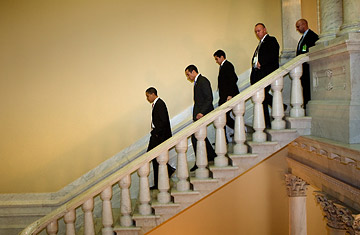
Barack Obama walks down stairs on Capitol Hill to participate in a series of votes, March 13, 2008.
They've been in office just 14 months — about as long as Hillary Clinton and Barack Obama have been running for President — but it's possible that the fate of the Democratic Party may just lie in their tender hands. They are the members of the 2006 freshman class on Capitol Hill, and they make up roughly a third of the 91 congressional superdelegates who have yet to pick sides in the high-stakes race between the two candidates for the presidential nomination.
Both campaigns have acknowledged that neither can win without the support of superdelegates, those 795 Democratic Party leaders granted floating votes that they may pledge or switch at a whim. But if the most inexperienced members of Congress are intimidated by the gravity of the situation, they're certainly not showing it. Despite being wooed heavily by both the Obama and Clinton camps, nearly half of the 40 House members and six of the eight Senators are still undecided. Some may still be holding out for promises, some are just slow in the deliberative process and some have made a firm choice to not decide yet at all.
"Even if the issues with seating the Florida delegates are resolved, I still don't intend on endorsing a candidate," said Ron Klein, a freshman congressman from Boca Raton who won his seat from Republican Clay Shaw with 51% of the vote. "I have excellent relations with both Senator Clinton and Senator Obama and they both understand my position. Why would I endorse and risk alienating a group of Democratic voters in a reelection race that promises to be incredibly close?"
It may sound reasonable, but the Clinton campaign isn't giving up without a fight. In recent weeks it has bent over backward to court the undecided freshmen, inviting many of them to a reception last week at Clinton's Washington home and assuring them that "she will be seen clearly as the most electable Democrat going forward," as Clinton senior strategist Mark Penn told reporters on a conference call over the weekend. "She will play strongly in November with key voting groups: Latinos, women, security moms that in 2004 made the difference." Likewise the up-for-grabs freshmen get near weekly calls from the Obama campaign, offers to meet with the candidates and their spouses and invitations to travel and see the candidates in action and experience the campaign trail.
Connecticut has no issues seating its delegates and Congressman Joe Courtney has already made his decision, at least in the privacy of the voting booth. But nothing is going to prompt him to announce that endorsement publicly. "Connecticut went for Senator Obama, although my district went narrowly for Senator Clinton," said the freshman. "But I think it's important to see how this process plays out, let all the voters have their say."
And Jason Altmire is weighing whether to wait and see what happens in his home state on April 22 or use his endorsement to try to help one candidate or the other win in western Pennsylvania. "It's a really tough decision and I think a lot of freshman, who are so new to Washington, are more apt to take their time in deciding in order to make the best possible choice," Altmire said.
Of the 20 House freshman that have already endorsed the bulk of them, 15, have gone for Obama. Clinton has the support of the four New York freshmen plus Joe Sestak of Pennsylvania, and the remaining 20 are undecided. If you add in the four Democrats who have been elected in special contests since 2006, Clinton gains one more vote, California's Laura Richardson; Obama wins another, Illinois' Bill Foster; and two more are still undecided.
To put their role in context: of 68 House members who remain undecided, 22 are freshmen. In the Senate only two of the eight freshmen have endorsed: Sheldon Whitehouse of Rhode Island threw his weight behind Clinton and Missouri's Claire McCaskill is supporting Obama. But Senators have the luxury of six-year terms whereas the House members go back to the polls in eight months, and whoever is facing off John McCain at the top of the Democratic ticket could have a major impact on their own races — a concern many freshmen have voiced about Clinton behind closed doors. Democrats won control of Congress in 2006 on the backs of the freshmen, and their swing districts are crucial must-wins for any presidential candidate on either side of the aisle.
What's remarkable, in many ways, is the freshmen's ability to resist the pressure and allure of endorsing — both of which are enormous. How does a first-term Congressman find the strength to say no to Hillary Clinton, or her husband, former President Bill Clinton? Or the veritable rock star that Barack Obama has become? Any one of whom, more likely than not, raised money and campaigned for you in 2006?
Of course, much of the party's leadership on Capitol Hill, such as House speaker Nancy Pelosi, as well as House and Senate Majority Leaders Steny Hoyer and Harry Reid, haven't picked candidates either, so the freshmen may have some cover when push comes to shove. But once all the primary voting is done, every superdelegate will theoretically be left to make up his or her own mind. And in that case, the biggest decision the Democratic Party could face in a generation may fall to the rawest of recruits. But, then again, perhaps that shouldn't be such a scary prospect. As the candidates themselves have been debating in recent weeks, maybe experience doesn't matter so much after all.
